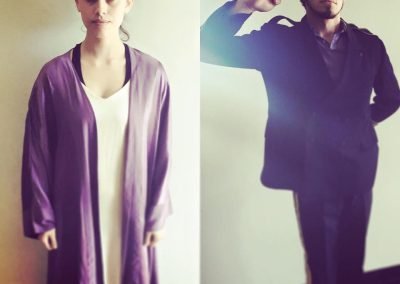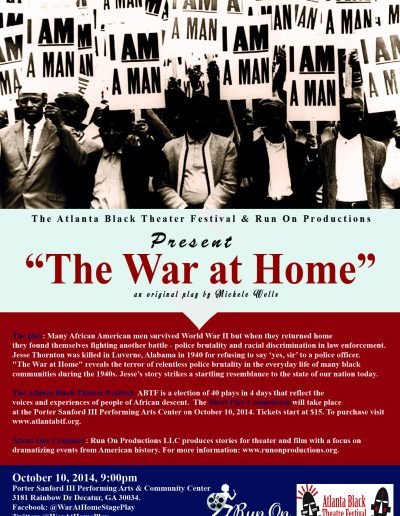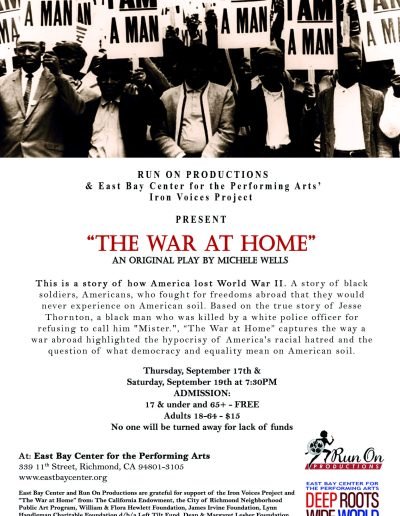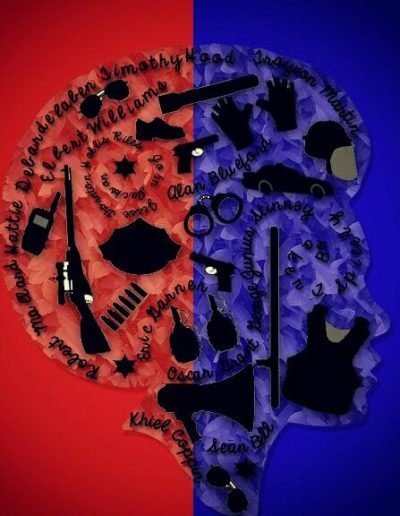The War at Home
Written & Directed by Michele WellsThis is a story of how America lost World War II. Jesse Thornton returns from defending his country in Europe only to realize an unfathomable truth — he will never taste the freedom he risked his life for abroad. America is the same: mob lynchings, Jim Crow segregation, separate but unequal schools, and racial terrorism. Based on the true story of Jesse Thornton, as investigated by the Civil Rights & Restorative Justice Project in Boston, MA — this is the story of a black veteran, chicken farm manager, who was killed by a white police officer for refusing to call him “Mr.” The War at Home considers the history of black soldiers, illuminates the sacrifices of black women who were not honored as Rosie the Riveter’s yet who worked and lost just as much and even more in losing their dignity, and a country grasping for answers to the question: what is democracy in for the Negro?
the plot
This is a story of how America lost World War II. Jesse Thornton returns from defending his country in Europe only to realize an unfathomable truth — he will never taste the freedom he risked his life for abroad. America is the same: mob lynchings, Jim Crow segregation, separate but unequal schools, and racial terrorism. Based on the true story of Jesse Thornton, as investigated by the Civil Rights & Restorative Justice Project in Boston, MA — this is the story of a black veteran, chicken farm manager, who was killed by a white police officer for refusing to call him “Mr.” The War at Home considers the history of black soldiers, illuminates the sacrifices of black women who were not honored as Rosie the Riveter’s yet who worked and lost just as much and even more in losing their dignity, and a country grasping for answers to the question: what is democracy in for the Negro?
jesse thornton
Jesse Thornton was the kind of man who held his community together. He was described by a friend as a man who was “hard-working and ready to fight if imposed upon.”
THE BARBERSHOP
This scene is the heart of The War at Home because it shows how the war impacted the lives of black Americans. It is a war on the mind, as represented by James, who is told that Juneteenth represents freedom yet cannot identify a clear definition of freedom. It is a war on the body of the laborer, as represented by Jack, who faces dangerous life-threatening work conditions at the local steel mill. It is a war on manhood, as represented by Jesse, who fought in the war overseas bravely and returns to find that now he has to redefine what it means to be a man in order to survive in a world where Nellie does the work that he once did. It is a war on tradition and comfort, as represented by Brandt, who is fearful of the ways of the young people who are demanding equal rights. And, finally, it is a war on the honor of black soldiers like Edward, who represents the war overseas, he went abroad and returns expecting to be upheld as a hero only to find he’s still not welcome to sit on certain train seats.
Director's Statement
There’s nothing new about The War at Home. The roots of an unequal, divided America — an America that treats African Americans as second-class citizens — stems from the Trans-Atlantic Slave Trade. In the 1940s, unequal treatment for African Americans remained embedded in the fabric of American legal, educational, and social systems. Against the backdrop of a war abroad, African American soldiers began to fight against inequalities overseas that made them aware of the need to resist injustices at home. Serving and fighting to protect their country and American values was an act of ownership. But it was unsettling. They saw that while their country could create opportunities for white and black Americans to fight alongside one another abroad, officers of the law were intent on violently oppressing their rights at home. In this way, I believe World War II sealed America as “home”. The change brought about by the war was that these soldiers came home knowing they weren’t anyone’s property – these were men and women and fighting for home.






